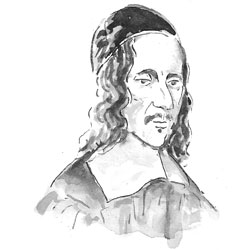Speaking, Writing, and Teaching: Herbert as Orator and Priest
Between 1620 and 1628 George Herbert served as University Orator at Cambridge, an office of considerable prestige that required Herbert to compose and deliver Latin addresses for formal occasions. Although the texts of three of Herbert's public orations still exist, such as that written for the presentation of honorary degrees to two European ambassadors by the University in 1622, we cannot be sure whether the extant English translations are Herbert's own. Furthermore, Herbert's prose is not as impressive or as moving in these Latin orations as it is in some of his other works. His personal letters, written to family and friends during his time at Cambridge, and his priestly handbook A Priest to the Temple, are a fairer demonstration of his mastery of prose form, his belief in the power of language, and his humility before God.
Two letters and extracts from A Priest to the Temple are read here by Mr Anthony Bowen, a Fellow in Classics at Jesus College, who held the five-hundred-year-old position of Cambridge University Orator between 1993 and 2007.
1. Letter to Sir John Danvers, Trinity College Cambridge, 18 March 1617 (Track 1, 04:58)
John Danvers, a wealthy politician, was Herbert's stepfather. In this letter Herbert writes to ask him for more money to pay for books, as he is now 'setting foot into Divinity' and beginning to 'lay the platform' of his future life as a clergyman. He claims that his need for more books and the costs of his recent illness have meant that he has been fasting to make his limited resources stretch further.
herbert-bowen-1Read the text of the letter (opens a new window)
2. Letter to Sir John Danvers, Trinity College Cambridge, September 1619 (Track 2, 03:20)
Having been in Cambridge for a decade now, Herbert tells his family that he is being considered for the position of University Orator, and must make an hour-long Latin oration the following week. With excited anticipation, he explains the responsibilities and duties associated with this position, albeit one which brings more glory in name than in financial reward. Sir Francis Nethersole, mentioned by Herbert as an 'ancient acquaintance', was the University Orator to whom Herbert served as deputy for a year. For Nethersole, who went on to become secretary of state, the position clearly provided opportunities to mix with influential people and to advertise to king and court his skills in the art of . Herbert's eventual decision to enter the Church meant that his own rhetorical prowess would find a use in a different setting.
herbert-bowen-2Read the text of the letter (opens a new window)
3. A Priest to the Temple, Chapter VI: The Parson Praying (Track 3, 04:22)
With meticulous precision, Herbert describes how the priest's words and actions should guide the congregation in corporate prayer. As he does constantly throughout A Priest to the Temple, Herbert advocates a devout moderation - the parson's spoken words should be 'treatable and slow, yet not so slow neither as to let the fervency of the supplicant hang and die between speaking, but with a grave liveliness, between fear and zeal, pausing yet pressing'. The priest's own behaviour and posture in church serve as a model for everyone else; in this way the priest draws the bodies and souls of the faithful closer to God as they are shown how to engage with the words they hear, and to 'meditate as they speak, that God hath ever had his people that have glorified him as well as now'.
herbert-bowen-3Read the text of the extract (opens a new window)
4. A Priest to the Temple, Chapter VII: The Parson Preaching (Track 4, 07:13, with some abridgements)
'Dangerous things': this is how Herbert describes the transformative qualities of a priest's sermons in this key chapter of A Priest to the Temple. In church the pulpit should be seen as the parson's 'joy and his throne', the place from which the words of scripture are expounded and meditated upon by the parson before his gathered flock. There is a true and simple art to preaching, Herbert argues, and the parson must decide how best to engage an audience of diverse people, perhaps with 'stories and sayings they will well remember' according 'as his text invites him'. The explanation of carefully chosen 'moving and ravishing texts' brings the faithful to a closer union with God. Above all however, the speaker must be concerned with reflecting upon the holiness of God, rather than his own wit or eloquence. The Bible is the most important of all written texts, and God the Judge is the preacher's ultimate critic.
herbert-bowen-4Read the text of the extract (opens a new window)
These readings bring together the ancient traditions of the office of University Orator, as it was practised in George Herbert's time, with the voice of one of the university's modern orators. This confluence of old and new is at the heart of much of the writing and reading on the Cambridge Authors site. If you want to think further about some of the issues raised here, read Raphael Lyne's examination of the 'Oratours place' in the life of a modern university.
